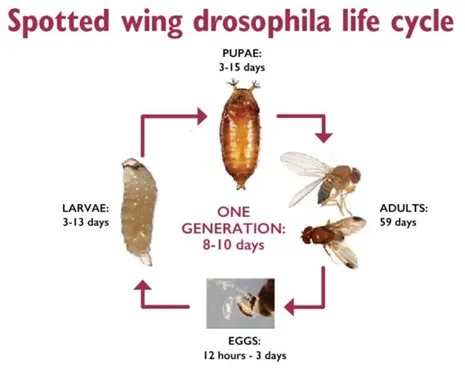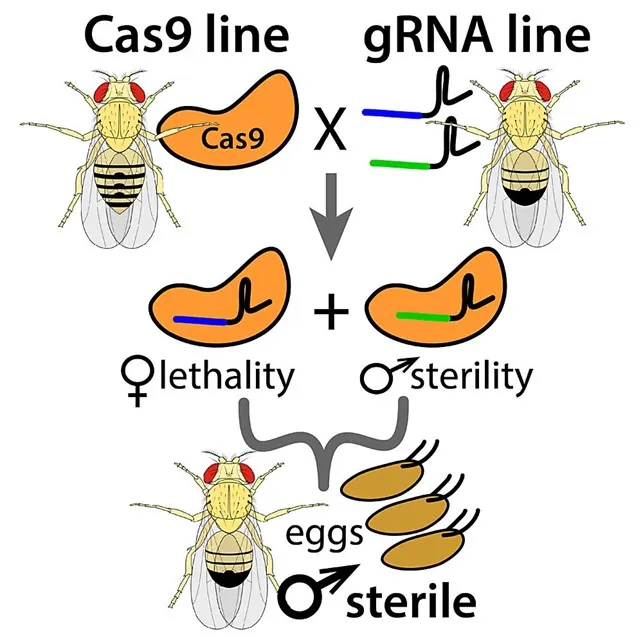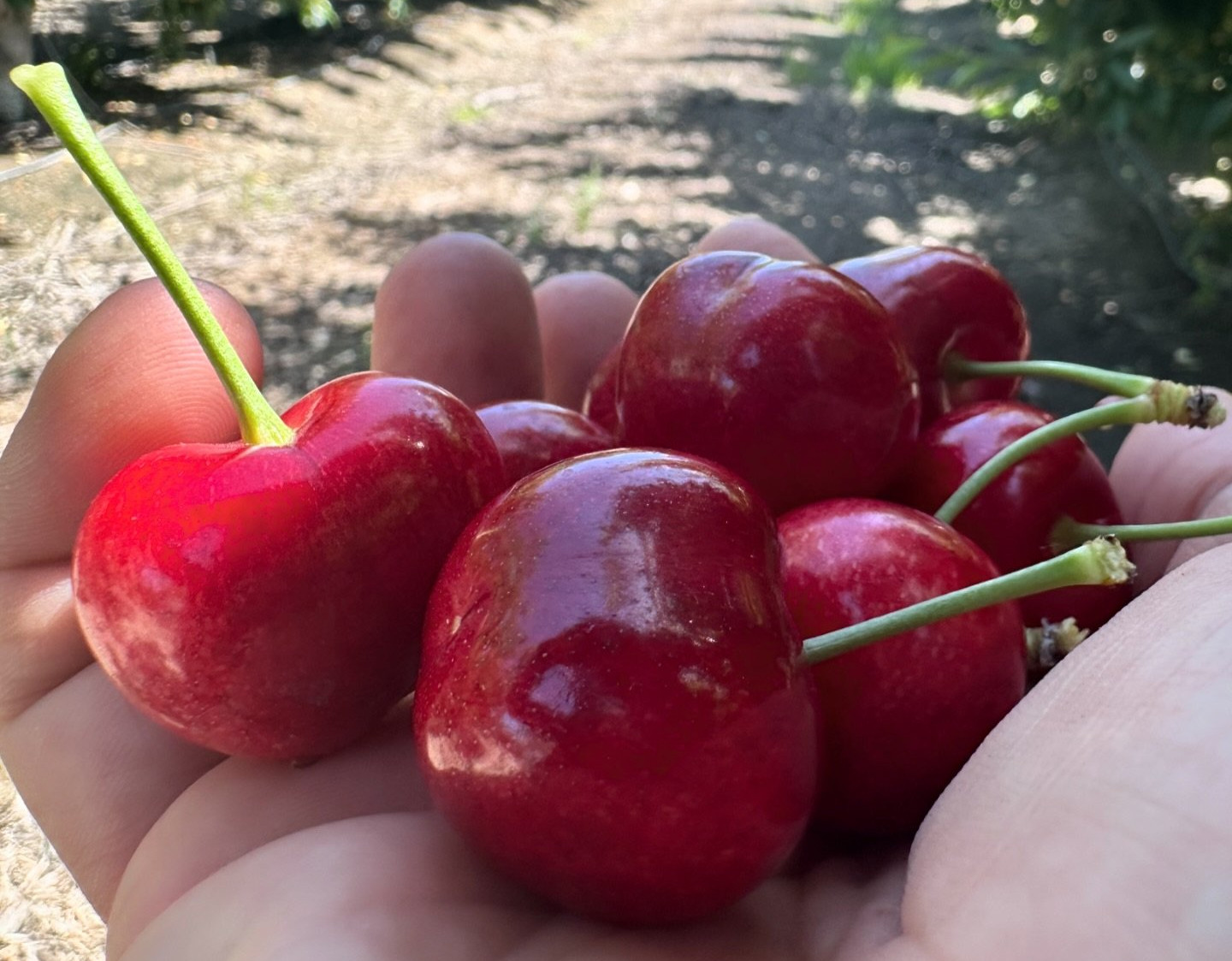A genetics company and an entomologist from Oregon State University spent the summer releasing sterile males of spotted wing drosophila genetically modified to prevent reproduction.
Outdoors. Without nets or cages. And nothing bad happened, as genetic engineering skeptics might have feared.
“It seems they stay fairly local,” said Chris Adams, who led the project for OSU.
This was the main lesson from an experiment with genetically sterilized SWD conducted by Adams and Agragene, a St. Louis company relying on research funded by the cherry and blueberry industries on the West Coast.
According to Adams' experience, SWD—the tiny, invasive fruit flies threatening the berry industries—stay close to home, traveling only a few trees away at most. The experimental, genetically modified versions followed the same habit, Adams said.
This result is crucial for advancing the so-called precision-guided sterile insect technique. The idea is that one day sterile male flies will mate with females, which will lay nonviable eggs, collapsing the invasive pest population and protecting the fruit.
The sterile insect technique has existed for decades, like the 30-year codling moth control program that uses moths sterilized through radiation treatments at a facility in British Columbia. Gene editing offers a new approach to producing sterility.
 Image 1: One of the main concerns about the spotted wing drosophila is related to the speed at which this pest reproduces.
Image 1: One of the main concerns about the spotted wing drosophila is related to the speed at which this pest reproduces.
The United States Department of Agriculture granted Adams and Agragene an experimental permit for weekly releases of genetically engineered (GE) males in a one-hectare block of cherries at the Mid-Columbia Agricultural Research and Extension Center at Hood River.
The team posed two questions:
- Will the modified CSPs stay near the release site and not disperse into nature?
- Will sterile males successfully mate with females to reduce the wild population?
According to Adams and Agragene, the first question received an affirmative answer. Adams placed monitoring traps in and around the orchard, full of shaded and moist canopies and plenty of fruit for egg-laying—a paradise for SWD. Based on the traps checked by Agragene in St. Louis, his team captured the GE flies only near the release site.
Question number 2, however, remains unanswered. The scorching summer wiped out all SWD, both genetically modified and not, making it impossible to determine whether the mating trick worked.
Application and History
Adams suspects the sterile insect technique could help organic growers, where insecticides are limited, or in habitats surrounding orchards, such as the abundant Himalayan blackberry thickets in the Columbia River Gorge, one of the most prolific cherry-growing regions on the West Coast.
“I see it as an excellent tool to control these flies where they can't be reached,” he said.
Additionally, in some areas of California, SWD are showing resistance to key insecticides.
Research is also ongoing into other forms of biological control, such as a parasitic wasp being studied in the United States and a yeast-based biopesticide under development at the University of California, Davis.
 Image 2: The Precision-guided Sterile Insect Technique involves using CRISPR/Cas9 and guide RNA to genetically create a brood of dead females and sterile males, which would then be released to mate with wild females, who would lay nonviable eggs, as shown in this diagram. It is one of several projects by researchers at the University of California, San Diego, to use genetic manipulation as a tool to control spotted wing drosophila.
Image 2: The Precision-guided Sterile Insect Technique involves using CRISPR/Cas9 and guide RNA to genetically create a brood of dead females and sterile males, which would then be released to mate with wild females, who would lay nonviable eggs, as shown in this diagram. It is one of several projects by researchers at the University of California, San Diego, to use genetic manipulation as a tool to control spotted wing drosophila.
Research on sterilization began years ago with projects by Omar Akbari, a genetics researcher at the University of California, Riverside. He later moved to UC San Diego and co-founded Agragene in 2017. The company acquired the intellectual property from the university in 2019.
In 2022, the company hired Stephanie Gamez (who earned her doctorate working on projects under Akbari) as director of research and development and moved to St. Louis, where lab and insectary space is less expensive, according to CEO Bryan Witherbee. This is where the insects are reared and shipped to Adams in cardboard boxes containing 2,000 each.
The entire system is designed to end with unfertilized eggs, so the modified genes die off when the insects die. Agragene boasts three years of data demonstrating 100% sterility. All males in the boxes are fully sterile; none has ever accidentally bypassed the process without being modified.
“We’ve done a lot of work to prove it,” said Witherbee. “There’s no way these genes can spread to the rest of the world.”
Agragene is seeking additional permits from the United States Department of Agriculture’s Animal and Plant Health Inspection Service to repeat the experiment at Hood River and add more locations, Witherbee said.
Images: Good Fruit Grower
Ross Courtney
Associate editor Good Fruit Grower
Cherry Times - All Rights Reserved












